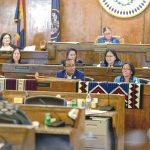
Northern Agency launches relief effort
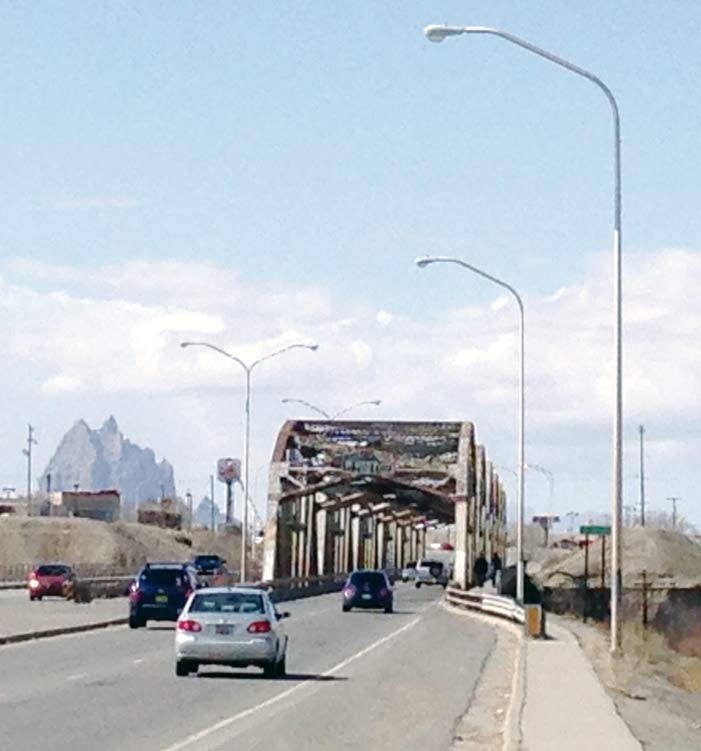
Navajo Times | File
Northern Agency, which includes both the busy town of Shiprock, shown here, and some very rural areas, is a challenging place to deliver aid, but a grassroots group has taken on the task.
WINDOW ROCK
The Northern Diné COVID-19 Relief Effort’s main goal is to reduce the spread of COVID-19 by delivering care packages to families in need — in the safest way possible.
With coronavirus running rampant on Navajo, it has been up to local community members to help with items and supplies so elders and young families don’t have to go to the store and put themselves at risk. But if volunteers aren’t careful, they risk becoming vectors themselves.
For the Northern Diné team, making sure volunteers practice the most safe and sanitary way to deliver these items is key. Kyle Jim, chief volunteer coordinator for the Northern Diné COVID-19 Relief Effort, said the care packages they hand out include food, water, firewood, livestock and domestic animal feed, baby essentials, plus educational materials for children.
“With the volunteers this is a grass-root effort,” said Jim, who said working with 20 communities within the Northern Agency means coordinating and having them identify local leaders and coordinators.
“We don’t want to step over our boundaries,” said Jim. “Even just to provide effective services it’s best to go through local coordinators or leaders because they are the ones who are experts in their areas.”
The team primarily serves Shiprock Chapter and adjacent communities in the Northern Agency. The chapter is by far the largest in the region with an estimated 8,300 residents and a Navajo Nation Council delegate representing it alone.
Two other Northern Agency delegates, working with the team, represent six and nine chapters respectively, according to the group’s gofundme account. They’ve also connected with community coordinators from Cove, Gadiiahi and Hogback. “Our main objective is prevention,” said Jim. “Given Northern Agency is least impacted by the virus, we want to keep those numbers down.” Although a grassroots effort, Jim said the group includes tribal and chapter officials.
And since prevention is vital, Jim said the volunteers go above and beyond to safely contact those they assist. He explained there is zero-point-contact delivery.
The group will call the families over the phone, get their location and once they locate the families they will ask them to stay inside so they can unload the firewood or hay bales. They place the food and care packages at the family’s door or on top of vehicles. “For documentation we don’t get signatures,” said Jim. “We take pictures of the food and the household. It doesn’t have to be the individual or family members. The whole idea is to document.”
PPE is standard eyewear, gloves, masks, long-sleeved shirts and pants. Zero point contact is stressed to volunteers and that means conversations with the families aren’t allowed.
The virus can be easily transmitted through droplets that enter into the eyes, nose and mouth. Also not permitted is entering people’s homes. “Our practices are necessary,” said Jim, “given the multitude spreading the virus, whether it’s through the relief team, coordinators, or even returning to their families and loved ones.”
Jim said during this time he has been doing much peer education on COVID-19 and why it needs to be taken seriously by the Navajo people, especially the Northern Agency youth.
“The youth don’t seem to understand the concept of what’s happening,” said Jim. “All they see is the reaction such as the curfew, the stores, social distancing. “I’m having to educate my peers to make them understand the severity of the virus,” he said. “How it attacks our lungs … it affects anybody and that’s why we need to practice social distancing. There needs to be awareness for youth and elders.”
Information: gofundme.com/f/northern-dine-
As a public service, the Navajo Times is making all coverage of the coronavirus pandemic fully available on its website. Please support the Times by subscribing.
How to protect yourself and others.
Why masks work. Which masks are best.
Resources for coronavirus assistance

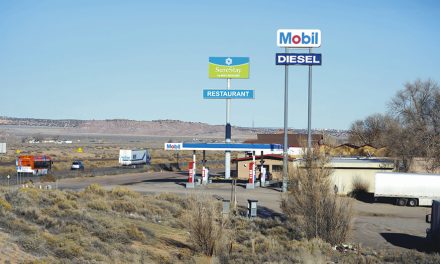
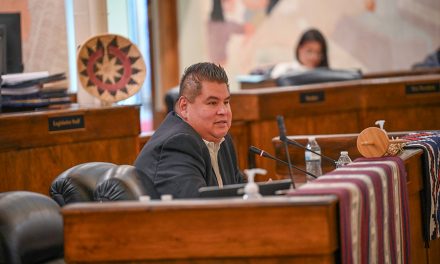

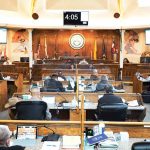



 Highway 264,
Highway 264, I-40, WB @ Winslow
I-40, WB @ Winslow